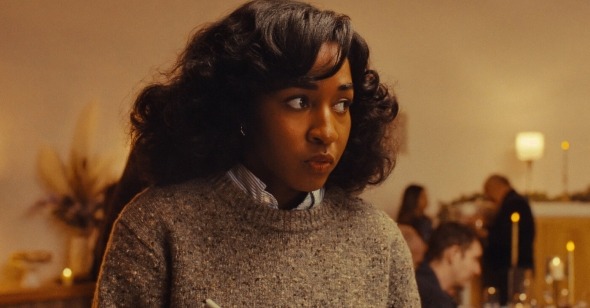Empty Vessels
By Katherine Connell
Opus
Dir. Mark Anthony Green, U.S., A24
“You can’t make friends with rock stars.” Amongst the quotable kernels of wisdom delivered by Philip Seymour Hoffman in Cameron Crowe’s Almost Famous, this might be the most prescient. If Crowe’s quasi-autobiographical coming-of-age story defined nostalgic representations of Anglo-American arts journalism for decades to come, the form it represented—articles built upon weeks or months of field reportage financially backed by magazines—had long been on its way out. While getting uniquely close to a source is a common journalistic fantasy, it seems decreasingly possible in 2025 when longform profiles are only greenlit by legacy publications with a small circle of writers; the rise of PR has increasingly mediated access to public figures; and social media serves up parasocial connections that can feel more intense than anything scribed. Amidst content mills, AI, and funding cuts, what it means to “make it” as a writer is more precarious patchwork than the hazily remembered “good old days.”
Tensions between an old and new guard of writers feature in Mark Anthony Green’s Opus, which twists the Almost Famous concept—a writer going on the road with enigmatic musicians—into a horror-comedy embittered about the state of relations between artists and critics. Ariel (Ayo Adebiri) is a junior staff writer at J (a thinly veiled GQ, where Green spent a tenure as an editor). Her boss Stan (Murray Bartlett) is a longtime music critic who accepts her pitches but assigns them to buzzier names. Though Ariel is ambitious, her boyfriend points out that she lacks the life experiences that might provide her writing with compelling grit. At the same time, these qualities that prevent her from standing out make her a tenacious and unassuming observer.
A montage of newscasts reveals that Alfred Moretti (John Malkovich), a fictional popstar of the ’90s who hasn’t released music in 30 years, has announced a new album. In pseudo–Willy Wonka fashion, Moretti delivers cryptic gift baskets inviting a select coterie of established rock writers including Stan, a major social media influencer, and to everyone’s surprise, Ariel, for a first listen at his compound. Here, Opus turns into a cult horror film in which blue linen clad devotees of Moretti, who live communally and ritually shuck oysters, begin to secretly off his guests. Ariel asks the right questions to develop a special connection with Moretti, though his answers also arouse her suspicions. Stan and his peers dismiss her anxieties as intolerance for bygone eccentricity that ought to be appreciated. In any case, these veteran writers are predisposed to giving the album a positive review. By flattering Moretti’s genius and maintaining the status quo, they’re able to relive their glory days. Their arrogant neglect of the very foundations of their profession—critical thinking and observation of one’s environment— proves fatal.
Analyzing the cultural attachment to white male artistic “genius” is well-tread intellectual ground. Beyond restating it as a hegemonic dynamic, Opus struggles to provide anything that might push this discourse further. Performing a song for his guests that sounds like Countess Luann covering the Pet Shop Boys, Moretti twirls them around and mimes lewd lap dances while wearing a Gaga-esque catsuit. Malkovich is wacky, weird, and magnetic, but none of this amounts to a convincing representation of a period-defining musician. One problem is that Moretti’s enclosed group of followers, called Levelists, functions didactically, swaying with literal stars in their eyes as their figurehead writhes onstage. That our societal relationship with celebrity is cultish is a takeaway so obvious that it beckons the viewer to search for more nuance.
Unfortunately, Opus has little new to say or show about cults either. Its visual pastoralism, costuming, and choreographed behaviors of the Levelists all feel too close to Midsommar. This homage to a very recent film is not inherently shallow, but the treatment of its onscreen group as cartoonishly murderous social deviants reproduces tired tropes played out in a long lineage of films about new religious movements. Moreover, since the recent public spectacle of NXIVM prompted so much contemplation about the entanglements between entertainment industries and coercive control, Opus seems almost apathetic in its inability to extend its parallels beyond limited filmic reference points. As cults have been increasingly in the zeitgeist from docuseries and podcasts to popular music, the Levelists appear to be more about latching onto a trendy aesthetic rather than massaging rich symbolism to draw out complex ideas. Being trapped by a zealous group with mysterious and unpredictable intentions could have made for provocative viewing, but the stack of missed opportunities that Opus accumulates imparts a sense of emptiness.
Even as Opus scrambles to collect its thoughts, it does succeed in communicating overarching cynicism towards contemporary arts journalism as a career path. Green delights in caricaturing established journalists (embodied by the comedic talents of Bartlett, Juliette Lewis, and Melissa Chambers) as stagnant sellouts stuck in the past. Although the youthful, ethically minded, and truth-seeking Ariel appears to be heroic by sheer contrast, Green is careful not to delineate a strict binary. Ultimately, Ariel gets duped by the Levelists, who stage a ritual suicide so that she’ll write about them, thus further disseminating their views. Two final scenes reveal that she has become a best-selling author profiting from Moretti’s false narrative, though one she believes to be true until a culminating tête-à-tête with him in prison. This twist ending, like much of Opus, is dramatically inert. Still, Green’s willingness to turn his earnest protagonist into an unintentional flop bested by systems perpetually out of her grasp resonates. In Almost Famous, the image of an article meeting its public is emblematic of permanence and promise. In Opus it represents success and failure commingling: these days, that’s the reality.
